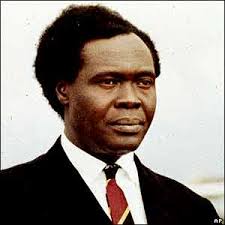Uganda’s founding father and first Executive President, Dr. Apollo Milton Obote
In 1963 the strength of the UPC was once again tested when the Party rejected any of its members to be elected to the office of the President and instead adopted Sir Edward Mutesa for the office.
The “Lost Counties” was a serious political issue both before Independent and after, up to the middle of 1964. The UPC took a decision to implement the constitutional provision which required the holding of a referendum.
UGANDA: In 1963 the strength of the Uganda People’s Congress (UPC) was once again tested when the party rejected any of its members to be elected to the office of the President and instead adopted Sir Edward Mutesa for the office. This decision was not favored by all the contenders to the office. The Rulers of Bunyoro, Toro, Ankole and Busoga met at Mbarara and selected a candidate for the office of the President. Their candidate was not Sir Edward. You will note that all the rulers were Bantu and yet they could not accept Sir Edward, the Kabaka of Buganda as President. The Democratic Party also did not accept Sir Edward, but the UPC succeeded once more to destroy tribal suspicions, and Sir Edward was elected President. After the election, and despite the fact that the other Rulers did not want Sir Edward to be President, the strength of UPC outside Buganda was not affected in any way. Indeed the Party increased its popularity, so much so that when elections to Federal Assemblies in Bunyoro and Toro, and District Councils throughout the country were held in 1964, the UPC won convincingly in all areas. All this constituted another landmark victory towards national unity, with UPC in the vanguard.
The “Lost Counties” was a serious political issue both before Independent and after, up to the middle of 1964. The UPC took a decision to implement the constitutional provision which required the holding of a referendum. Although speeches in the Mengo Lukiiko included statements to the effect that the issue of the “Lost Counties” could only be resolved through bloodshed, the issue of the “Lost Counties” was settled constitutionally. That must certainly be another landmark in the changing Uganda, and it is a landmark that indicates quite clearly that although it was possible in those days to seek the cooperation of Buganda (Mengo) it was not essential to comply with their wishes. What they considered fundamental to them but not to Uganda, the UPC on national grounds rejected the same. Those who dealt with myths when discussing the affairs of Uganda, and represented that unless Mengo agreed to this or the other the Government of Uganda was impotent to implement have always missed this vital point.
Perhaps another landmark is that although the UPC was in alliance with Kabaka Yeka (KY) in 1964, the fact did not prevent the UPC from opening branches in Buganda Region in defiance of representations and opposition from Mengo. The opening of UPC branches in Buganda region in defiance of those representations and opposition from Mengo (Kabaka’s Government) and the KY as a political force, illustrates the characteristic of the UPC to make every endeavor to work for the interest of Uganda as a whole, and that the alliance with KY then did not in the opinion of the Party, amount to a charter which debarred the UPC from operating in Buganda. The Party has never wanted any part of its policy to be determined by another body outside itself, and the attempt by the KY and the Kabaka”s Government to oppose UPC operations in Buganda region after Independence were rejected on the ground that the Party could not allow any outside body to determine where the Party should operate or should not do so.
Then there were demands which are commonly known in Uganda as “our things”, which included a range of subjects in the 1962 Constitution which Mengo and the Mengo Lukiiko wanted to be transferred to the Kabaka’s Government as their “things”, merely because Buganda was in a special position and KY was in alliance with UPC, but not because there were provisions of the Constitution for doing so. These demands were rejected by the UPC Government. Some of the subjects went to the Courts up to the Privy Council, where Mengo lost. Once more you see in these matters the constant concern of the UPC not only to abide by the constitutional provisions, but also to expose any myth that might have existed in the minds of citizens or others, be they friends or detractors. The rejection by the UPC Government of a series of demands by Mengo in 1963 and 1964 exposed the myth that any time Mengo wanted anything the Government of Uganda had to comply, or that even today the Government of Uganda has to frame policies covering the welfare of the citizens of Uganda on the basis of the situation in Buganda Region.
Next week we shall see the events which led to what became known as “Uganda Crisis” of 1966 and the overthrow of the Independent constitution of 1962.












